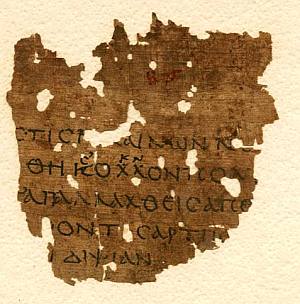2005 Summer Reading
The Burial at Thebes
Manuscripts
by Prof. Michael Arnush, Classics
Most of the earliest surviving manuscripts of the Antigone date from the middle of
the 10th century to the early Renaissance - specifically, the late 15th and early
16th centuries. Indeed, Aldus Manutius, a renowned typographer and printer of Greek
texts in the early Renaissance, printed the first handheld, "paperback" edition in
Venice in 1502 (click here for four images of a copy in Brigham Young University's
library; 1502 was the same year Aldus published a now-famous exquisite edition of
Dante's L'Inferno, Il Purgatorio, and Il Paradiso, pictured here). Our own Scribner
Library Special Collections has on loan from Prof. David Porter, president emeritus,
a copy of an edition in Greek and Latin published by another noteworthy printer, Paulus
Stephanus, in Geneva in 1602 (see pictured here the title page and the opening of
the Antigone). Archaeological excavations in Egypt and Italy have uncovered caches
of papyrus fragments of Greek and Latin literature dating to over 1000-2000 years
earlier. The example below comes from the Egyptian city of Oxyrhynchus (map) and dates
to the 2nd century CE. Above the image of the scrap of papyrus - which gives you some
sense of how fragmentary our early evidence sometimes is for Greek literature - is
a transcription of five lines of Greek from the exchange between Creon and the Guard,
and Heaney's translation of the same (which appears at the top of page 20 of your
copy). In the transcription, those Greek letters within the brackets [ ] do not appear
on the papyrus fragment, and those letters outside the brackets are preserved. Can
you identify the letters on the papyrus?
Papyrus fragment of Sophocles Antigone lines 242-246 (transcription begins with line
241)
| Creon | [εὐ̂ γε στοχάζει κἀποφάργνυσαι κύκλῳ] [τὸ πρα̂γμα: δηλοι̂ς δ' ὥ]ς τι ση[μ]αινω̂ν νέο[ν.] |
Why do you need such fences and defences? / Your news is hardly all that desperate |
| Guard | [τὰ δεινὰ γάρ τοι προστί]θησ' ὄκνον πολ[ύν.] | Desperate enough to panic me, your honour. |
| Creon | [οὔκουν ἐρει̂ς ποτ', εἰ̂τ'] ἀπαλλαχθεὶς ἄπε[ι]; | Then get it out, man, as you say yourself, / and get it over |
| Guard | [καὶ δὴ λέγω σοι. τὸν νεκ]ρόν τ[ι]ς ἀρτίω[ς] [θάψας βέβηκε κἀπὶ χρωτ]ὶ διψίαν. |
Well, here's what it is. The corpse. Somebody has as good as / buried it. Somebody's after attending to it right. Casting the / earth on it and all the rest. |
